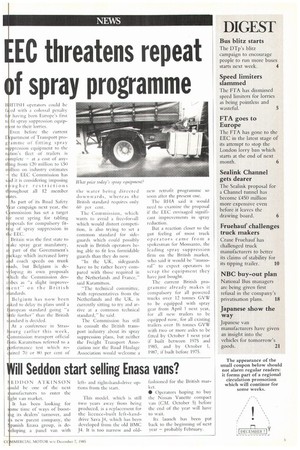EC threatens repeat f spray programme
Page 5

If you've noticed an error in this article please click here to report it so we can fix it.
ZITIS1 I operators could he -ed with a colossal penalty having been Europe's first fit spray suppression equipin to their lorries.
Even before the current partment of Transport proamme of fitting spray ppression equipment to the don's Beet of trailers is mplete — at a cost of any ing from million to .:50 illion on industry estimates the EEC Commission has d it is considering imposing uglier restrictions roughout all 12 member res.'
As part of its Road Safety ar campaign next year, the mmission has set a target r next spring for tabling oposals for compulsory fitag of spray suppression in c EEC.
Britain was the first state to ake spray gear mandatory, part of the Government's ckage which increased lorry d coach speeds on trunk ads, but Belgium is deloping its own proposals hich the Commission desibes as "a slight improveent'' on the British andards.
Belgium has now been ked to delay its plans until a uropean standard going "a tie further" than the British andard is decided.
At a conference in Strasourg earlier this week, ommission transport official tis Karamitsos referred to a rfbrmance test which re
ired or 80 per cent of
the water being directed downwards, whereas the British standard requires only 60 per cent.
The Commission, which wants to avoid a free-for-all which would distort competition, is also trying to set a common standard for sideguards which could possibly result in British operators being able to fit less formidable guards than they do now.
"In the UK, sideguards have to be rather heavy com pared with those required in the Netherlands and France," said Karamitsos.
"The technical committee, with representatives from the Netherlands and the UK, is currently sitting to try and arrive at a common technical standard," he said.
The Commission has still to consult the British trans port industry about its spray suppression plans, but neither the Freight Transport Asso ciation nor the Road Haulage Association would welcome a
new retrofit programme SO soon after the present one.
The RHA said it would need to examine the proposal if the EEC envisaged significant improvements in spray reduction.
But a reaction closer to the gut feeling of most truck operators came from a spokesman for Monsanto, the leading spray suppression firm on the British market, who said it would be "immoral" to expect operators to scrap the equipment they have just bought.
The current British programme already makes it compulsory for all powered trucks over 12 tonnes GVW to be equipped with spray gear from April 1 next year, for all new trailers to be equipped now, for all existing trailers over 16 tonnes GVW with two or more axles to be fitted by October 1 next year if built between 1975 and 1985, and by October 1., 1987, if built before 1975.




































































































